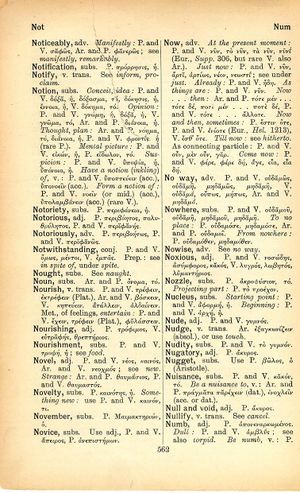notion: Difference between revisions
From LSJ
(6_11) |
(D_6) |
||
| Line 11: | Line 11: | ||
{{Lewis | {{Lewis | ||
|lshtext=<b>nŏtĭon</b>: ii, n.,<br /><b>I</b> a [[plant]], [[otherwise]] called [[cucumis]] [[silvaticus]], App. Herb. 113. | |lshtext=<b>nŏtĭon</b>: ii, n.,<br /><b>I</b> a [[plant]], [[otherwise]] called [[cucumis]] [[silvaticus]], App. Herb. 113. | ||
}} | |||
{{Gaffiot | |||
|gf=<b>nŏtĭon</b>, ĭī, n., concombre sauvage : Ps. Apul. Herb. 113. | |||
}} | }} | ||
Revision as of 06:58, 14 August 2017
English > Greek (Woodhouse)
subs.
Conceit, idea: P. and V. δόξα, ἡ, δόξασμα, τό, δόκησις, ἡ, ἔννοια, ἡ, V. δόκημα, τό. Opinion: P. and V. γνώμη, ἡ, δόξα, ἡ, V. γνῶμα, τό, Ar. and P. διάνοια, ἡ. Thought, plan: Ar. and P. νόημα, τό, διάνοια, ἡ, P. and V. φροντίς, ἡ (rare P.). Mental picture: P. and V. εἰκών, ἡ, P. εἴδωλον, τό. Suspicion: P. and V. ὑποψία, ἡ, ὑπόνοια, ἡ. Have a notion (inkling) of, v.:P. and V. ὑποπτεύειν (acc.), ὑπονοεῖν (acc.). Form a notion of: P. and V. νοεῖν (or mid.) (acc.), ὑπολαμβάνειν (acc.) (rare V.).
Latin > English (Lewis & Short)
nŏtĭon: ii, n.,
I a plant, otherwise called cucumis silvaticus, App. Herb. 113.
Latin > French (Gaffiot 2016)
nŏtĭon, ĭī, n., concombre sauvage : Ps. Apul. Herb. 113.

